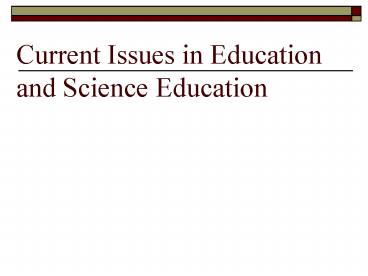Current Issues in Education and Science Education - PowerPoint PPT Presentation
1 / 21
Title:
Current Issues in Education and Science Education
Description:
Current Issues in Education and Science Education ... Big issues in science education today. ... Classrooms in which students were using worksheets (a bad sign): 52 ... – PowerPoint PPT presentation
Number of Views:1520
Avg rating:3.0/5.0
Title: Current Issues in Education and Science Education
1
Current Issues in Education and Science Education
2
What are the main reasons our schools are not
being successful?
3
What changes in our schools do you think would
result in the biggest payoff in terms of better
preparing our graduates for the future?
4
What do you consider to be the big issues in
science education today?
5
Discussion Questions Be ready to report back . .
. .
- Reasons for schools NOT being successful.
- School changes resulting in the biggest payoffs
for students. - Big issues in science education today.
6
Results Now How We Can Achieve Unprecedented
Improvements in Teaching and Learning
by Mike Schmoker
- ASCD Publication, 2006
7
A sobering recent study based on 1,500 classroom
observations points out some classroom trends.
(Learning 24/7, 2005).
- Classrooms in which there was evidence of a clear
learning objective 4 - Classrooms in which student-centered teaching
strategies were being used 0.2 - Classrooms in which there was evidence of
higher-order thinking 3 - Classrooms in which students were either writing
or using rubrics 0
8
Classroom observations continued
- Classrooms in which fewer than one-half of
students were paying attention 85 - Classrooms in which students were using
worksheets (a bad sign) 52 - Classrooms in which non-instructional activities
were occurring 35 - Such statistics point to how even fairly
obvious actions could have an immediate and
enormous impact on students and their levels of
learning.
9
- What are the barriers to change for each of
these issues?
10
Barriers to Change
- Barrier 1 Science Textbooks
- Science textbooks play a crucial role in
science education. Its estimated that between
90-95 of teachers surveyed use textbooks 90 of
the time as their major curriculum materials.
11
Barrier 2 Pressure to prepare for college
- The goal of academic preparation continues to
dominate science education.
12
Barriers Identified by Science Teachers
- NSTA asked science teachers if they thought
the Standards would improve the way science is
taught in their classrooms, - 80 percent of the teachers who answered the
question said yes. - Seventy-five percent also believed that the
Standards would improve the way science is taught
in their schools.
- NSTA administered in January, 1996 to 5000
randomly selected NSTA members. The surveys
return rate was more than 38 percent (1,900
returned). Eighty-seven percent of these
respondents were teachers.
13
The three top barriers cited overwhelmingly by
the respondents were the need for
- adequate time for planning and working with other
teachers - financial support for relevant professional
development - science materials, resources, and facilities
14
- Classroom teachers are the key decision makers
in terms of course content, textbook selection,
instructional strategies, teaching style,
selection of texts, etc. Because of this, they
are the real determiners of the goals of science
education.
15
Science Education Issues can Typically be
Separated into Three Areas
- INSTRUCTION How should we teach?
- CURRICULUM What should we teach?
- ASSESSMENT How should we measure student
learning?
Reform will require change in these three areas
16
Additional issues listed on following pages
17
Sample Science Education Issues
- Are standardized tests appropriate to measure
achievement in science? - Preparation for college vs. preparation for life
- Should science be basic for elementary school?
18
- Should science teach evolution?
- Should a few topics be covered in depth or should
many topics be surveyed? - Should chemistry be taught before biology?
- Should physics be taught first?
19
- Should environmental awareness be included as
part of science? - Should the history of science be included in
science courses? - Textbooks vs. no textbooks for elementary science
- Should we use cooperative groups?
20
- Should evaluation be subjective or objective?
- Should science be required for high school
graduation? - Should students receive science credits for
health?
21
Assignment 2 Current Issues in Science
Curricula
Write a position paper on a current issue in
science curricula. You may use an issue from the
class-generated list of come up with a different
one. Your paper should explain the various sides
of the issue and give arguments for your position
which are based on research, NSTA (or other
authoritative) support, and/or examples. Prepare
an 5-10 minute (approximately) presentation on
your selected issue.































